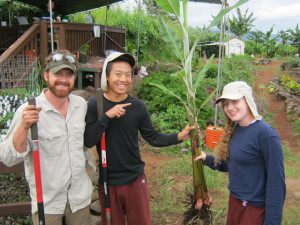By Travis Slagle, Horticultural Therapy Director
 Changing the world is not an easy business, and for mental health providers, changing a life can be just as complicated. Many people enter the field of outdoor therapy because they want to change lives. For students at Pacific Quest, the most basic therapeutic task is to literally practice new ways of caring about life. We are digging, planting, composting, harvesting, and sharing abundance in a rhythmic pattern not just because it’s cool to grow your own food, but also because it fits within a sequential model of neuropsychology. We believe learning to grow food is a relevant and transferable therapeutic activity for a generation of young people that are faced with a daunting need to create a more sustainable future not just for themselves but for their families and communities.
Changing the world is not an easy business, and for mental health providers, changing a life can be just as complicated. Many people enter the field of outdoor therapy because they want to change lives. For students at Pacific Quest, the most basic therapeutic task is to literally practice new ways of caring about life. We are digging, planting, composting, harvesting, and sharing abundance in a rhythmic pattern not just because it’s cool to grow your own food, but also because it fits within a sequential model of neuropsychology. We believe learning to grow food is a relevant and transferable therapeutic activity for a generation of young people that are faced with a daunting need to create a more sustainable future not just for themselves but for their families and communities.
A young person who recently graduated from the adolescent program wrote the following note (below) in a group journal. This note offers an example of what Horticultural Therapy at Pacific Quest is all about. It serves as a reminder that while we continue to remain in the business of changing lives, our clients are the ones that might just change the world, and perhaps there is no better outcome than that.